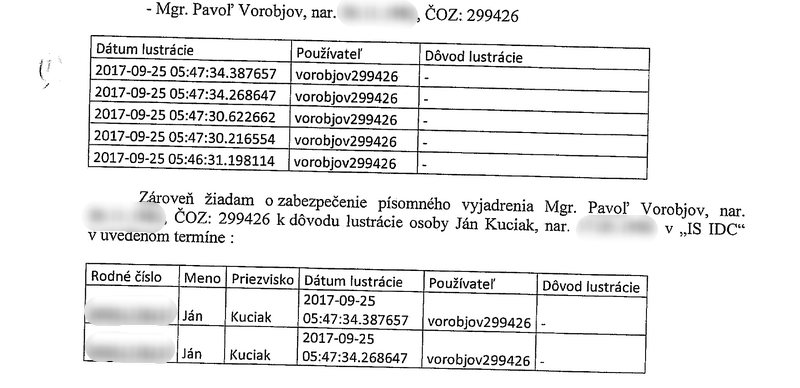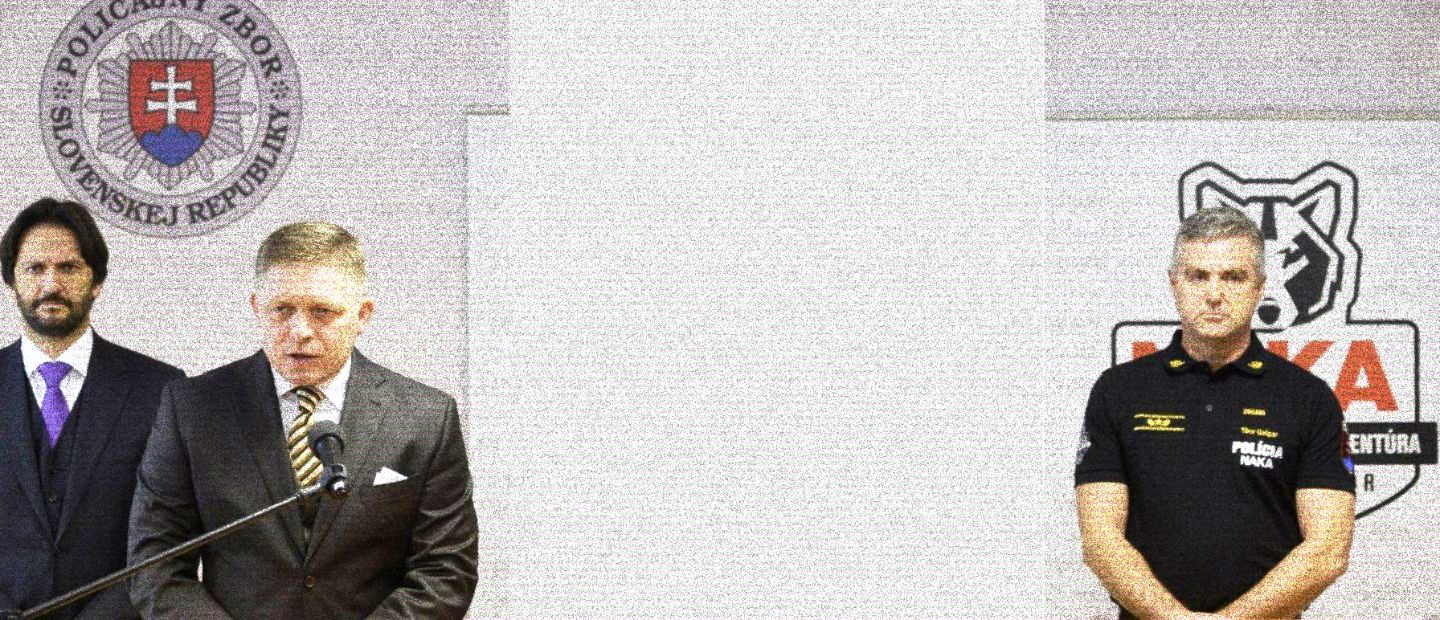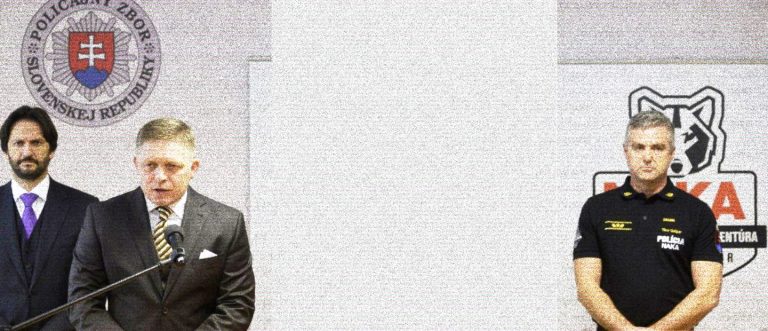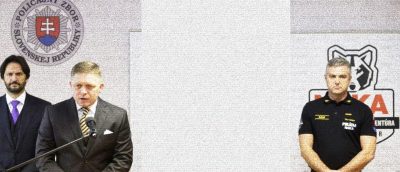Prime Minister Robert Fico has named Smer MP and former national police chief Tibor Gašpar as the most serious candidate for the position of director of the Slovak Information Service (SIS). This position, the head of Slovakia’s integrated domestic and foreign intelligence agency, is one of the most important in the security forces—and would be occupied by a man accused of several criminal offenses. Among them is membership in an organized criminal group, which, according to investigators, de facto controlled the police before 2018. According to the indictment, the anonymous group was headed by Gašpar’s relative, Norbert Bödör, an oligarch close to Smer.
Gašpar’s name also appeared in the Ján Kuciak murder case, although witnesses have changed their testimonies about how, exactly, he was involved. Convicted ex-policeman Pavol Vorobjov originally told police that it was Gašpar who ordered his illegal “lustration” in police databases. Lustration here refers to the process of searching a person in the state databases to obtain all personal information about him, including addresses, license plate numbers, information about relatives, etc. In this case, the information was used in the surveillance of the investigative journalist by the team employed by oligarch and convicted criminal Marian Kočner. The results of the surveillance were in turn used by the killers of Jan and his fiancée, Martina Kušnírová. However, Vorobjov later changed his testimony.
“Tibor Gašpar is for me one of the hottest candidates for this position [head of SIS],” Prime Minister Robert Fico has repeatedly said. He wants to install him as head of Slovak intelligence despite the disapproval of President Zuzana Čaputová. The ruling coalition even decided to change the law so that the next SIS director, if he were to be by chance also an MP, would simply vacate his other position as a member of the National Assembly of the Slovak Republic, rather than relinquish it; were he to stop being head of the SIS, he could simply reclaim his seat. Technically, Gašpar would still remain a member of parliament, yet an absent one. This would mean additional protection from him as he could keep his immunity as MP (parliamentary consent is required for the possible pre-trial detention of a member of parliament which it is not for the head of the SIS.)
Experts say the appointment of such a person—namely, a person facing criminal charges—to be director of the secret services is a serious threat to the credibility of the SIS.
“After the turbulence and scandals of recent years, the SIS has long since ceased to act as a credible partner at the international level. The possible nomination of Tibor Gašpar to head the service only confirms this state of affairs, and the SIS will lose the last vestiges of trust of its allies with this move,” warns Andrea Michalcová, security analyst and director of the Prague-based Center for an Informed Society.”In the intelligence community abroad, the Slovak intelligence service will thus be added to the category that cannot be trusted, and they will only be able to exchange information with other compromised services,” Michalcová said.
“We are smaller than Austria and Hungary, more vulnerable, so we have to rely more on our international partners on intelligence sharing,” a Slovak government official recently told VSquare, emphasizing that it is crucial for the Fico government to prove to EU and NATO partners that they are still reliable allies. However, several European sources from the security and intelligence community confirmed to ICJK.sk and VSquare that multiple allied intelligence services had already stopped sharing more sensitive information on the war in Ukraine and counter-intelligence matters concerning Russia and China with Slovakia. This started when Fico’s new pro-Russian government took over in October 2023. But should Tibor Gašpar become the head of SIS, the situation with intelligence sharing could get even worse and lead Slovak intelligence into isolation – especially that there are serious allegations about how Gašpar and his subordinates in the police were illegally sharing sensitive information with criminals.
Who is Tibor Gašpar?
Tibor Gašpar had to resign as the president of the Slovak police after protests began in 2018 over the murder of investigative journalist Ján Kuciak and his fiancée, Martina Kušnírová.
After the change of government in 2020, his former subordinates accused Gašpar of a series of offenses and he now faces charges in several cases. He is accused of bribing NAKA (National Criminal Agency) investigators to influence politically sensitive cases. He is also accused of influencing a witness, and, most importantly, of founding and co-directing an organized criminal group allegedly headed by the oligarch Norbert Bödör, who is also a member of his family. In December of last year, Gašpar was also accused of having taken part in the illegal wiretapping of a café owned by opposition politician Milan Krajniak while president of the Slovak police.
According to the original testimonies, Gašpar was also indirectly involved in the surveillance of journalists. Former police officer and former Gašpar subordinate Pavol Vorobjov testified that it was Tibor Gašpar who ordered illegal background checks on and database searches for various journalists, including Ján Kuciak.

Thanks to the surveillance, Kočner’s operatives and later the murderers knew the exact address of Ján Kuciak. Source: Kočner’s Library/OCCRP
The police databases then provided a Slovak oligarch with important political and organized criminal ties, Marian Kočner, with the addresses or license plates of these journalists. This information was then used by the surveillance team working for Kočner and, in the case of Ján Kuciak, by murderers.
Pavol Vorobjov has been convicted for his involvement in the illegal police database searches of a total of 140 people. In addition to journalists, he also invoked the procedure against politicians, such as former prime minister Igor Matovič and special prosecutor Daniel Lipšic, on behalf of the criminal group that was supposed to be headed by Bödör—with Gašpar serving as second in command. Vorobjov was sentenced to two years, but served 17 months in prison before he was paroled by the court in April 2023.Vorobjov received a lesser sentence because he confessed to the acts and cooperated with the police. However, he later changed his testimony about Gašpar and the background checks ordered by him.
Who ordered the background check on Ján Kuciak?
Marian Kočner ordered the surveillance of the journalists. This is confirmed by evidence and numerous testimonies in the case of Ján Kuciak and Martina Kušnírová’s murders. According to Peter Tóth, an ex-SIS operative who assembled and coordinated the surveillance squad for Kočner, the surveillance was also financed by oligarch Norbert Bödör (Bödör denies this).
It was through Bödör, Tóth said, that data that was dug up via police background checks of monitored journalists, including Ján Kuciak, were able to reach Kočner and Tóth’s team.
Vorobjov is directly responsible for the illegal background checks on journalists. Though sometimes he tasked his subordinates to run these searches, he sometimes carried them out himself.
For example, in the case of Ján Kuciak, the first database search did not contain Kuciak’s exact address. This was because Ján Kuciak had just changed his permanent residence in 2017. He moved it from his parents’ house to the town of Veľká Mača, where he and Martina Kušnírová had just bought an older house that they were renovating on their own. Vorobjov therefore repeatedly searched the police databases in order to obtain the exact address in Veľká Macha.
Messages in the Threema app recovered from Marian Kočner’s mobile phone indicate that Marian Kočner subsequently, days after Vorobjov found Kuciak’s address, met Norbert Bödör in person. Later on that same day, Kočner sent Jan Kuciak’s address to Petr Tóth. A day later, the commando already began the surveillance of the investigative journalist.
There is no doubt that Vorobjov held information illegally obtained from police databases on journalists, including Ján Kuciak, in his hands and that Marian Kočner received this information. However, Vorobjov did not hand it directly to Kočner. It is likely that the information about Kuciak reached him through Gašpar and Bödör.
The fact that Gašpar was involved in the background checks was mentioned by Vorobjov in his statement to the investigators working the case of the murder of Ján Kuciak and Martina Kušnírová on December 18, 2018, which we have access to as part of the Kočner’s Library project—a gigantic leak concerning the murder case investigation—run by OCCRP, an international network of investigative journalists.
“It was ‘lustrated’ on the instructions of the leadership of the Presidium of the Police Force, for the President Tibor Gašpar,” Vorobjov testified at the time about why he had run the database searches on Ján Kuciak. “It was an output in the form of a relationship diagram… in this system there are several pieces of data about the person, his relatives in the direct line, his personal data, documents, residence. This person Ján Kuciak was represented in this way in this relationship diagram.”
Vorobjov also testified that he handed the documents with Kuciak’s personal information directly to Tibor Gaspar: “Subsequently, after the inspection, I handed over this relationship diagram to the president of the Police Force.” Tibor Gašpar denied this allegation in his testimony.
Later, however, Vorobjov suddenly changed his testimony. On May 7, 2019, he claimed that he did not remember who had made the background check request to him. “The said request came either by phone or in person in the course of official business,” Vorobjov offered in the new testimony. “In my previous testimony I stated that it was a request from Mr Gašpar, but with hindsight I have to say that it was an assumption from my point of view, as I do not remember exactly where the request came from, as we received hundreds of such requests… every year,” he said in an attempt to explain the changes in his testimony.
He also denied his earlier words about the fact that he handed over the background check results to the president of the police force.
In an amended statement, Vorobjov claimed that he did not even remember whether anyone came to get the documents, whether he handed them over to anyone, or whether he destroyed them. This part of his testimony was also described as “illogical” by the judges of the Specialized Criminal Court in their first verdict on the murder case in 2020.
What do other suspects suggest about Gašpar?
Although Vorobjov’s memory betrayed him during repeated testimonies, another relevant individual—Ludovít Makó—still recalls the events. According to investigators, Makó, the former head of the Financial Administration’s criminal office (Slovak tax investigators) and a co-accused in many cases, was also part of the organized group supposedly headed by Bödör and Gašpar. Unlike them, however, Makó has confessed to his crimes.
In one of his statements, he also spoke about the illegal background checks and how he was confided in by Pavol Vorobjov:
“Vorobjov said that he was pressured by the leadership to lustrate various journalists and politicians,” Makó testified regarding a conversation he was supposed to have had with the person responsible for the illegal police database searches while Makó and Vorobjov were on vacation together in Turkey. Makó testified that he asked Vorobjov if he was “normal” since illegal database searches, from his point of view, had “crossed the line.”
“To this he told me that he had no other choice, as they were pressuring him and then trying to make some of those lustrations official with [made up] requests from the NAKA’s NJFP (National Unit of the Financial Police – ed.),” Makó said of Vorobjov’s response.

Records of the surveillance of Jan Kuciak by Pavol Vorobjov. Peter Juhás confirmed that they came to Vorobjov on the basis of information from Branislav Zurian. Source: Kočner’s Library/OCCRP
The fact that Vorobjov acted on the orders of Tibor Gašpar during the lustration is also confirmed by the testimony of the former head of NAKA, Branislav Zurian.
Zurian became head of NAKA in 2019, after the murder of Ján Kuciak, which happened in February 2018. In May 2021, he was accused of leaking information about investigations to criminals. However, in June 2021, the charges were dropped by the Prosecutor General’s Office. In 2023, Zurian was re-accused by the Police Inspectorate, only to have the case dropped again by the Prosecutor General’s Office in May 2023.
Zurian testified before investigators in 2021 in another case; there, too, he described how he confronted Vorobjov about his conduct regarding illegally scrutinizing the police database for information on Ján Kuciak, as Vorobjov’s previous versions of the story made no sense to him.
“After some time, maybe 30 minutes, Pavol Vorobjov came to my office and told me in a shaky voice that he was not responsible for anything. That his superiors wanted him to do it. He brought me a record, written on an A4 paper, in which it was stated that he had carried out lustrations on the instruction of the president of the Police Force,” Zurian said in his statement, according to a TV Markíza report.
It remains a mystery where the official record that the database search was ordered by Tibor Gašpar went. Zurian told investigators that he had the record in his safe. He later told journalists that he meant only a copy, because he had handed the original to investigators working the case of the murders of Ján Kuciak and Martina Kušnírová.
The head of the investigation team, Peter Juhás, says he has never seen the document. Nor is it among the documents from the leaked investigation files, which ICJK.sk has access to as part of the Kočner’s Library project. Zurian has shown neither the original nor the alleged copy to the public.
We also asked Tibor Gašpar to respond to questions about whether, as police president, he knew about the database searches of journalists, including Ján Kuciak; whether he ordered them; whether he took them over from his subordinates; and whether he handed them over to his relative Norbert Bödör. We sent the questions to his official email address, which he has as a member of the National Assembly of the Slovak Republic. We did not receive any reply.
“He has brought something to politics that has not been there for a long time. Calmness, professionalism, professional expression, he is always well prepared. It breaks with my idea that I would want exactly such a person at the head of the SIS,” Robert Fico said about Tibor Gašpar in December 2023.
However, President Zuzana Čaputová is currently standing in Gašpar’s way to head the SIS. She already stated while forming the government that “if the accused person were to become interior minister, I would consider that a very questionable nomination,” adding that the president should be able to reject a nominee about whom she has serious doubts. She announced the same approach for the head of SIS. She acted accordingly in August 2023, when she removed SIS chief Michal Aláč, after he was accused in another criminal case.
Fico, however, disputes the president’s arguments: “If the president defended the Čurilla team… so I don’t see why it should be a problem that a person who is accused should not be the director of the Slovak Information Service,” Fico said, comparing the accusations of NAKA investigators led by Ján Čurilla, who investigated many corruption cases of people close to previous Fico governments, and who are facing criminal investigations based primarily on manipulated recordings, with the cases of of the former police president.
Cover photo: Robert Kaliňák, Robert Fico and Tibor Gašpar during a press conference, 1.02.2017, Bratislava. Source: Ministry of Interior of Slovak Republic
The Slovak version of this article was published on icjk.sk
Tomáš Madleňák is a Slovak journalist who has worked for the Investigative Center of Ján Kuciak since 2020. He is based in Bratislava.







